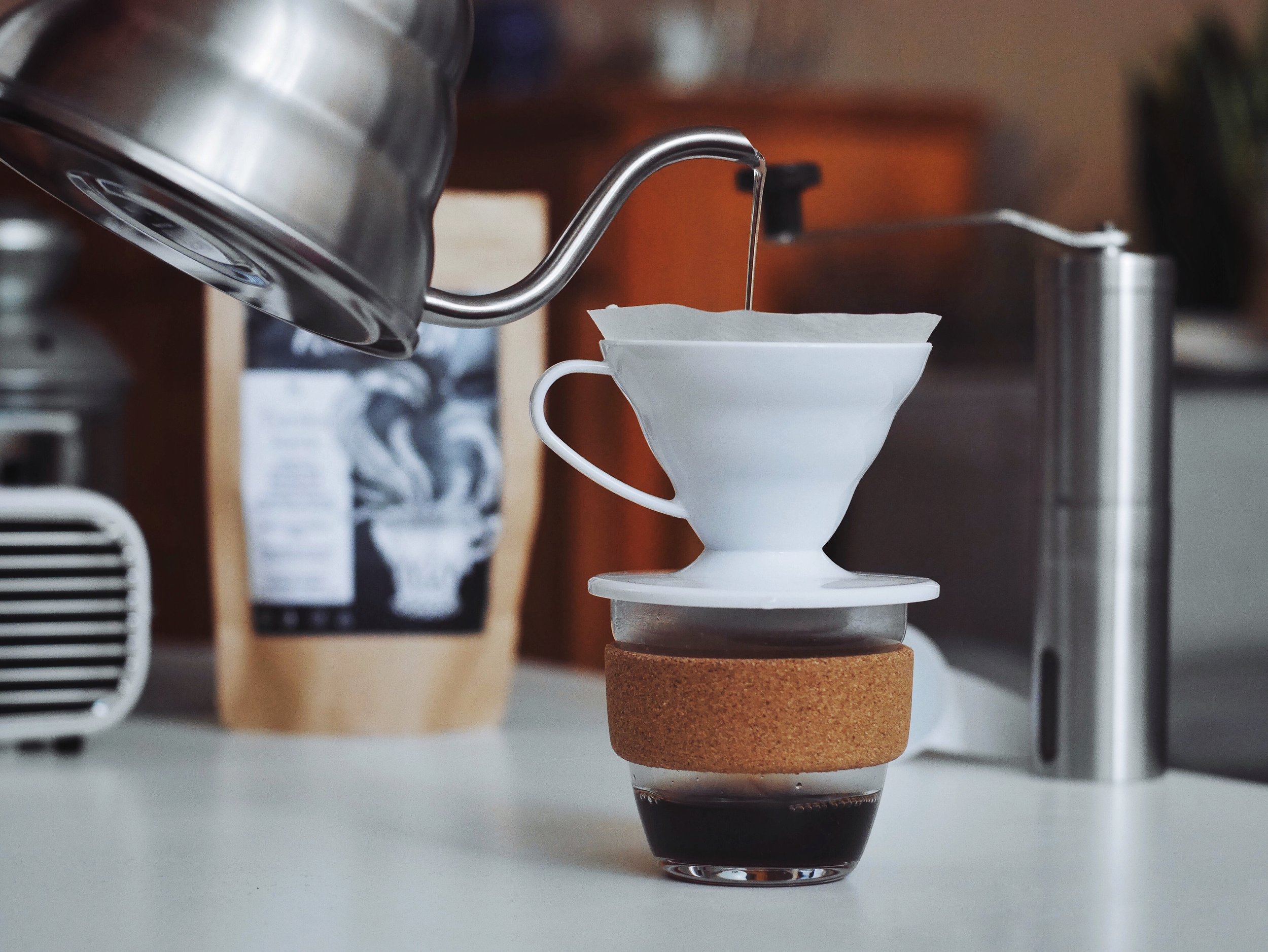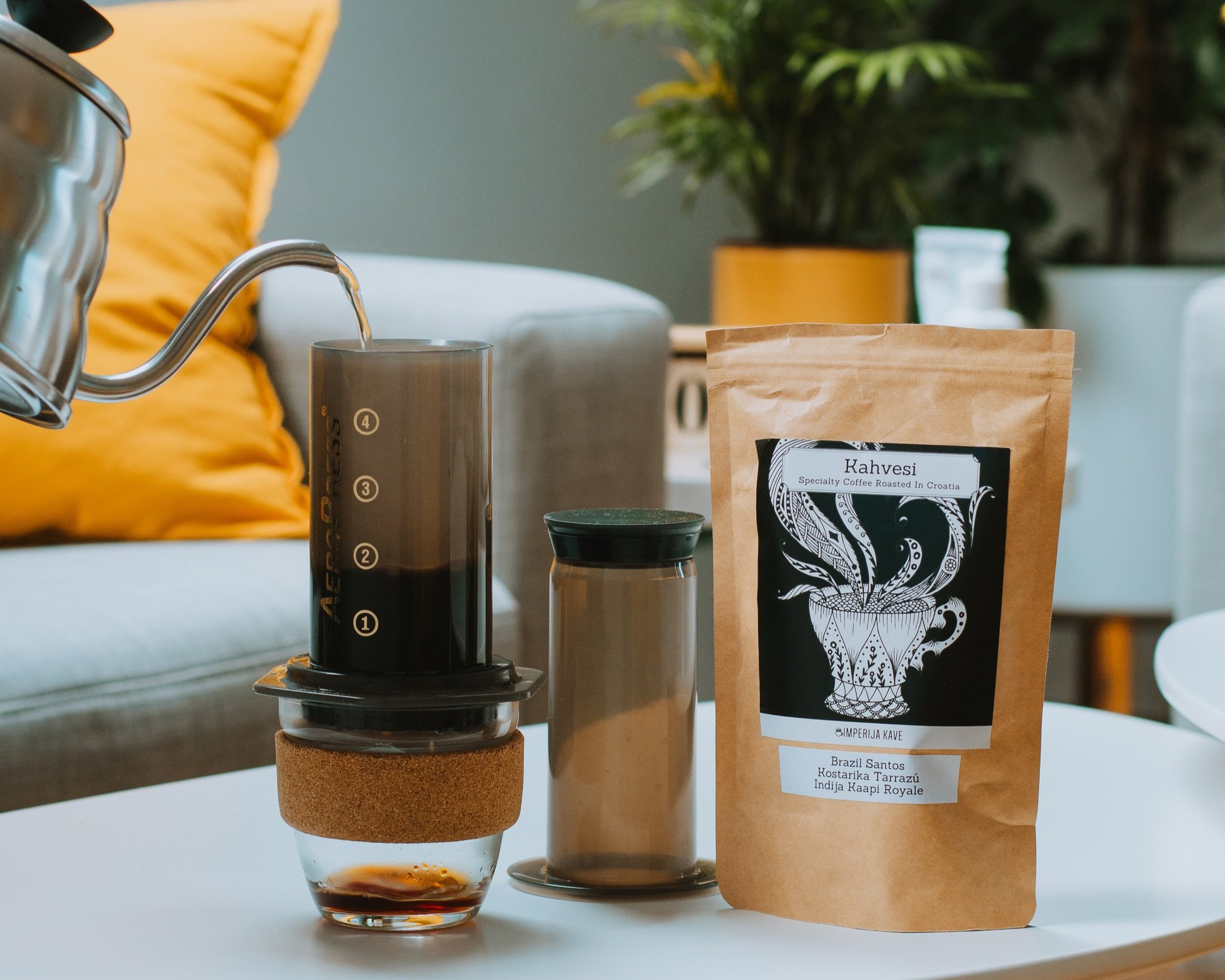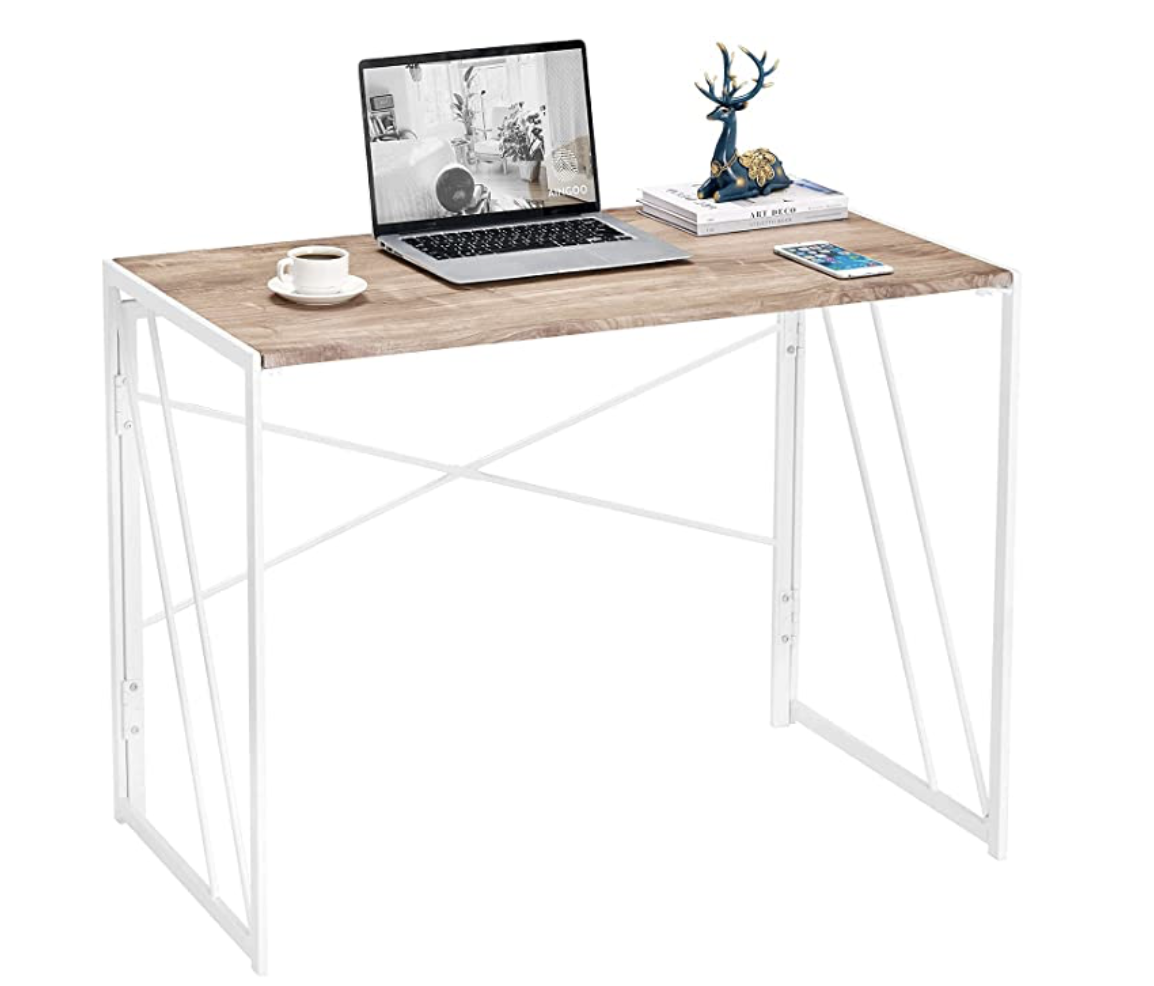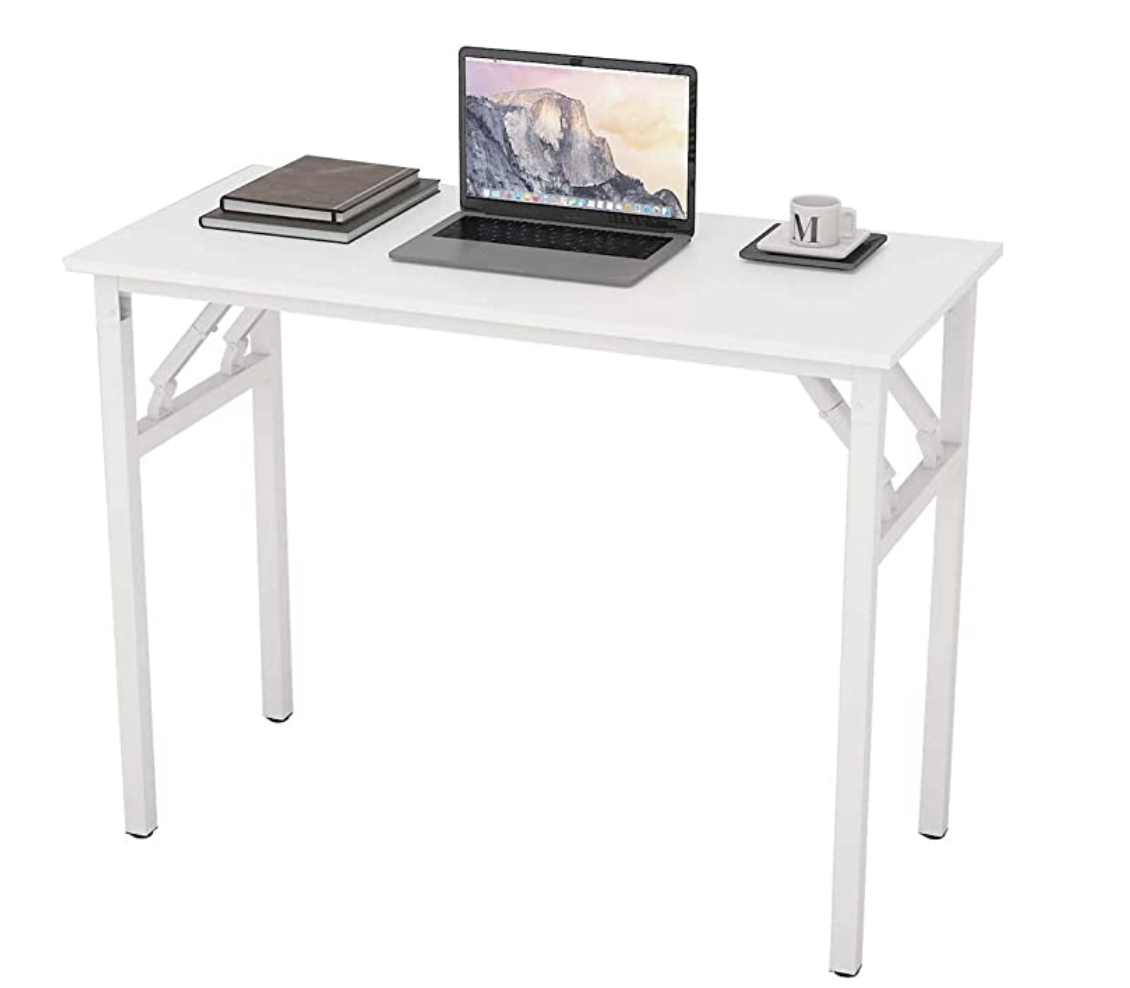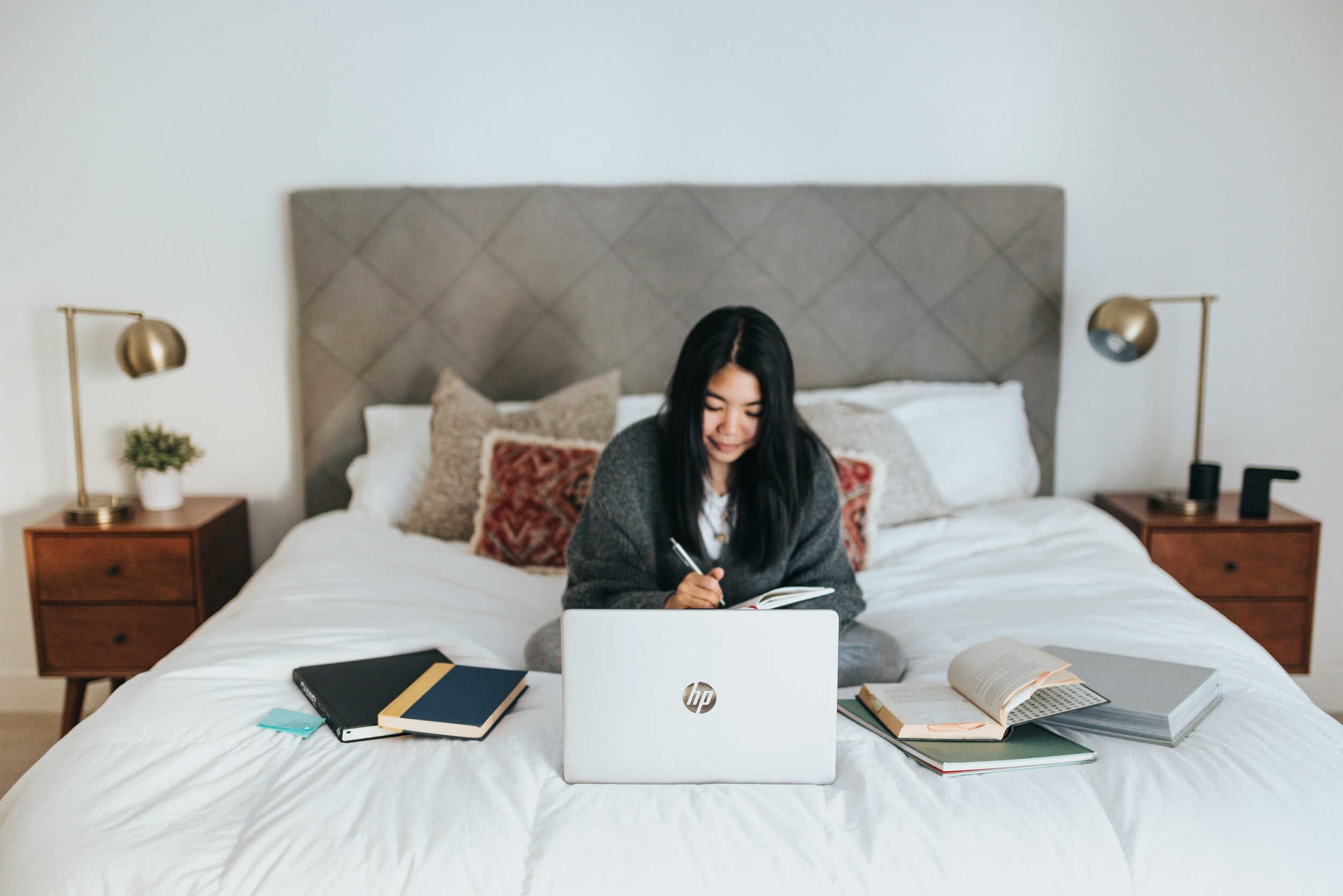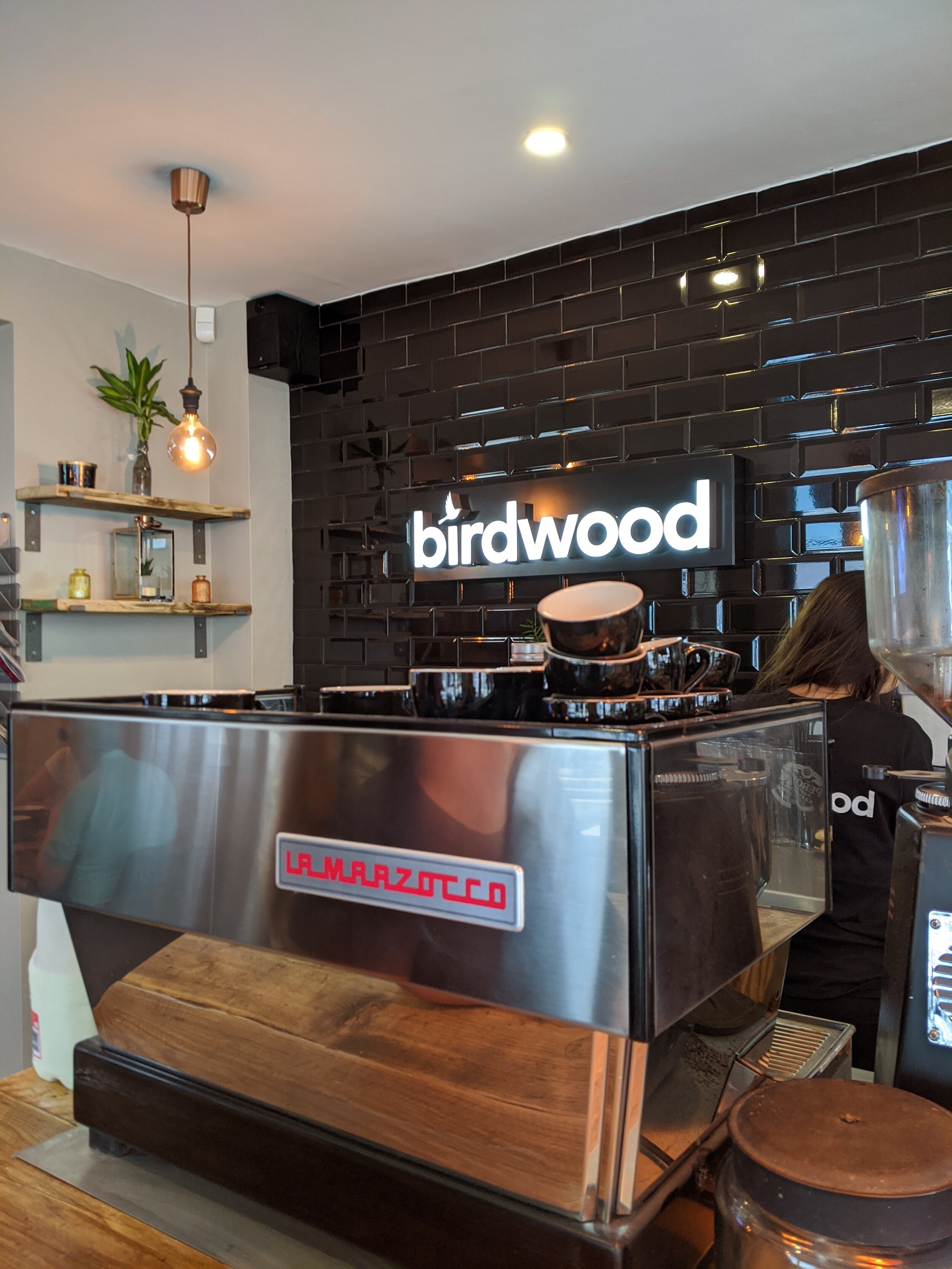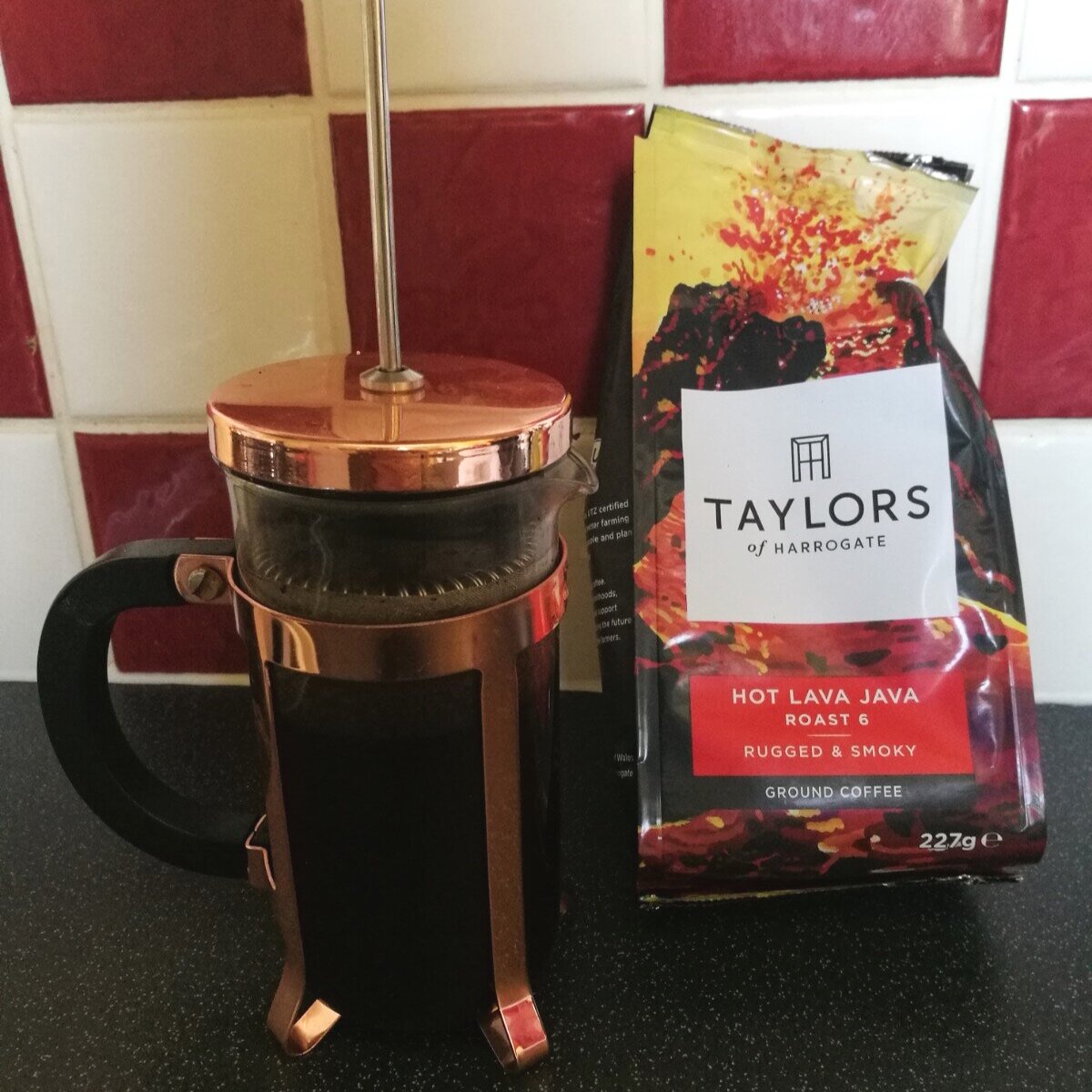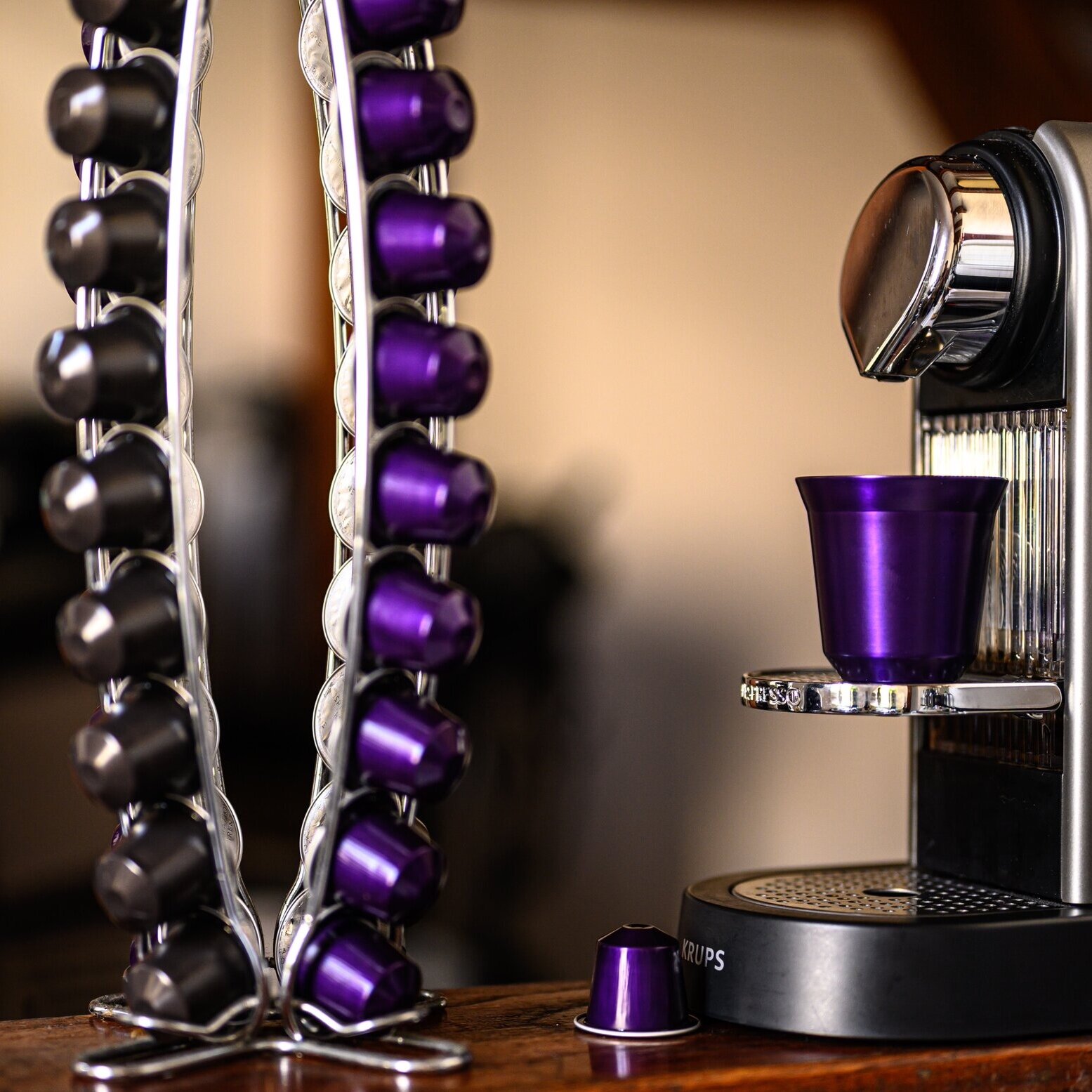Aeropress vs V60 vs French Press: the best manual coffeemakers to up your home brewing game
If you’re looking to step up your manual coffee brewing game, you can take your coffee from mediocre to magnificent with a manual coffeemaker and a little know-how.
Coffee connoisseurs rejoice! When you’re thinking about the best way to make coffee at home, do you think about buying an automatic coffee machine or a manual coffeemaker? A manual coffeemaker gives you ultimate control over the coffee you make, and there’s a huge range of makers available.
What’s the best manual coffeemaker?
Making great coffee at home doesn’t need to be hard. While it may seem daunting, anyone can brew delicious, fresh coffee at home with the right equipment and clever pour-over methods. If you’re looking to step up your brewing game, you can take your coffee from mediocre to magnificent with a manual coffeemaker and a little know-how. Read on to learn more about the best manual coffeemakers available, so you can make barista-style coffee at home.
Disclaimer: Product links on our website are referral links. If you use one of these and buy something, we make a little bit of money. Learn more here.
French press/cafetière
If you’re looking for an easy pour-over-style method of coffee brewing, look no further than a French press or cafetière. If you’ve ever used one, you know it takes several minutes (but only about 4-5 minutes) to brew a pot of coffee with one.
This is your typical “immersion brew” method - as your ground coffee is immersed in water, and is loved by coffee drinkers for the ease and speed of crafting a beverage.
Did you know you can make more than just coffee in your cafetière? Read our French press hacks.
Chemex
The Chemex is a wonderfully retro-looking pour-over glass coffeemaker. It works by infusing - or dripping - water through coffee grounds that sit in a filter to the glass chamber's bottom half.
Chemex filters are typically thicker than ones used for other devices, like the V60, so the brews are slower - but often richer in flavour. Overall, fans love the coffeemaker because it’s known for delivering a smooth cup of coffee.
Hario V60
Like the Chemex, the V60 is an infusion-based (or drip-brew) pour-over manual coffeemaker. However, it’s a lot more portable than the Chemex, thanks to its teacup-shaped design. Because you place it directly above your cup, it’s also a convenient choice, for a quick clean up.
The V60 works by inserting a filter paper into the v-shaped cup, which is placed directly on top of your drinking cup, adding your coffee grounds, and then slowly pouring hot water on top.
Aeropress
The Aeropress is a cross between a pour-over, a French press and an espresso machine. How? You pour water on top of your coffee grounds, you plunge just as you would with a cafetière, and it relies on the element of pressure, which is crucial in brewing espresso.
Just like the V60, the Aeropress is a manual coffeemaker designed with convenience in mind. You can take it with you and brew it directly into your cup of choice, with the pressure of the plunging motion forcing the water through to extract the coffee flavour and oils.
More work from home advice…
Key 2022/23 tax year dates, deadlines & thresholds
Here are the self-assessment tax return dates, VAT return dates and thresholds for income tax, NI and minimum wage in 2022/23.
Whether you’re working from home as a self-employed individual or an employee, it’s always helpful to know the latest tax year dates in the UK, which came into force in April 2022.
Here are the self-assessment tax return dates, VAT return dates and thresholds for income tax, NI and minimum wage in 2022/23.
Want to know the dates for 2021/22? Check them here. Or click for 2023/24 tax year dates or 2024/25 tax year dates.
When does the 2022/23 tax year start?
The 2022/23 tax year begins on 6 April 2022 and ends on 5 April 2023.
Self-assessment tax return dates 2022/23
Here are your Self Assessment tax return dates, and other important deadlines for individuals and self-employed in the 2022/23 tax year:
| 5 April 2022 | 2021/22 tax year ends |
| 6 April 2022 | 2022/23 tax year begins |
| 31 July 2022 | Second Payment on Account (POA) for Income Tax for 2021/22 |
| 5 October 2022 | Deadline for Self Assessment registration to notify chargeability of Income Tax/Capital Gains Tax for 2021/22 |
| 19 October 2022 | Deadline for postal payments of CIS, Class 1 B NICs and PAYE to HMRC |
| 22 October 2022 | Deadline for electronic remittance of CIS, Class 1 B NICs and PAYE to HMRC |
| 31 October 2022 | Deadline for postal submission of Self Assessment tax returns for tax year ended 5 April 2022 to be received by HMRC |
| 30 December 2022 | Deadline for online submission of Self Assessment tax returns for tax year ended 5 April 2022 |
| 31 December 2022 | Due date to file company accounts with Companies House for limited companies with 31 March 2022 year end |
| 14 January 2023 | Income tax due date for CT61 period to 31 December 2022 |
| 31 January 2023 | Deadline for filing Self Assessment Tax Returns for tax year ended 5 April 2022 and 2021/22 Capital Gains Tax
Balancing payment of tax due for 2021/22 and first Payment on Account for Income Tax for 2022/23 |
| 5 April 2023 | 2022/23 tax year ends |
| 6 April 2023 | 2023/24 tax year begins |
Deadlines for submitting VAT returns 2022/23
The deadline for submitting your return is 1 month and 7 days after the end of the VAT period, whether you pay your VAT monthly or quarterly.
Here are the key dates for submitting VAT returns in the 2022/23 tax year:
| 7 April 2022 | Deadline for VAT returns and payments of Accounting Quarter period ending 28 February 2022 |
| 7 May 2022 | Deadline for VAT returns and payments of Accounting Quarter period ending 31 March 2022 |
| 7 June 2022 | Deadline for VAT returns and payment Accounting Quarter period ending 30 April 2022 if filed online |
| 7 July 2022 | Deadline for VAT returns and payments of Accounting Quarter period ending 31 May 2022 |
| 7 August 2022 | Deadline for VAT returns and payments of Accounting Quarter period ending 30 June 2022 |
| 7 September 2022 | Deadline for VAT returns and payments of Accounting Quarter period ending 31 July 2022 |
| 7 October 2022 | Deadline for VAT returns and payments of Accounting Quarter period ending 31 August 2022 |
| 7 November 2022 | Deadline for VAT returns and payments of Accounting Quarter period ending 30 September 2022 |
| 7 December 2022 | Deadline for VAT returns and payments of Accounting Quarter period ending 31 October 2022 |
| 7 January 2023 | Deadline for VAT returns and payments of Accounting Quarter period ending 30 November 2022 |
| 7 February 2023 | Deadline for VAT returns and payments of Accounting Quarter period ending 31 December 2022 |
| 7 March 2023 | Deadline for VAT returns and payments of Accounting Quarter period ending 31 January 2023 |
PAYE tax rates & thresholds 2022/23
Employee Personal Allowance: £12,570
Basic Rate Tax Band: 20% on income between £12,571 and £50,270
Higher Rate Tax Band: 40% on income between £50,271 and £150,000
Additional Rate Tax Band: 45% on income above £150,000
National Insurance Contributions 2022/23
Class 1 National Insurance threshold: £9,568 per year
If you earn below £9,568 you will not pay any National Insurance contributions
If you earn between £9,568 and £50,720 you will pay NICs at 12%
On earnings above £50,720 you will pay National Insurance at 2%
National Minimum Wage and National Living Wage 2022/23
From 1 April 2022, the National Minimum Wage and National Living Wage is increasing. The minimum hourly wage depends on worker status and age:
For employees aged 23 and above, the minimum hourly rate is £9.50
For employees aged 21 or 22, the minimum hourly rate is £9.18
For employees aged between 18 and 20, the minimum hourly rate is £6.83
For employees under 18 years old but above compulsory school leaving age, the minimum hourly rate is £4.81
For apprentices of all ages, the minimum hourly rate is £4.81
More information is available at gov.uk.
Read more working from home tips & guides:
These 5 Mac productivity tips will transform your work life
Do you ever get the feeling that although you use a Mac everyday, perhaps you’re not getting the most of out it? We all know about using ⌘+space to bring up Spotlight right. Right?!
Do you ever get the feeling that although you use a Mac everyday, perhaps you’re not getting the most of out it? We all know about using ⌘+space to bring up Spotlight right. Right?! Some workflows can grow increasingly cumbersome and measured over a long period of time it all adds up to a waste in efficiency. So, it all sounds easy, but who has the time to learn some simple tricks to transform their work life? Well, the good news is that below we have brought together the 5 best productivity tips that every Mac user should be using for work, and it only takes 5 minutes to implement!
1. Use Mac’s version of ‘Task Manager’ with a handy shortcut
The Mac Task Manager is a mini-version of the Activity Monitor which is perfect for older or less-capable Macs that struggle with multi-core processing leading to crashes. Force quitting these unresponsive apps will be a lifesaver and isn’t widely known by a lot of users. To open the ‘Task Manager’, simultaneously press down the [COMMAND ⌘] + [OPTION ⌥] + [ESC] keys on your keyboard (or ESC on the Touch Bar). This will open a window containing a list of all currently opened programs and applications that are running in the background and allows you to close the apps that are causing you problems.
2. Utilise ‘Hot Corners’
Hot Corners allow you to use the four corners of your Mac’s display as a trigger for invoking one of several configurable actions. Why is this useful? It’s very reliable and guaranteed to work no matter where you are on your Mac. I know for a fact that whenever I place my mouse pointer in the bottom left-hand corner of the screen, my shortcut action will instantly be displayed, every time. To set up Hot Corners on your Mac:
Click on the Apple menu > System Preferences, then do one of the following:
Click Desktop & Screen Saver, then click Screen Saver.
Click Mission Control.
Click Hot Corners.
For each corner you want to use, click the pop-up menu, then choose an option, such as Notification Centre, Launchpad or Lock Screen.
To use one or more modifier keys with the hot corner, press and hold the Command, Shift, Option or Control key while viewing the pop-up menu.
When you’re done, click OK.
3. Customise your Dock and Taskbar
It cannot be emphasised enough that the Mac’s default setup for the Dock and Taskbar are not ideal for high productivity and efficiency, especially for work life. They are unnecessary clutter that can get in the way of your everyday workflows which help us stay on-task and focused. We recommend quickly removing everything except the essentials from your Dock and Taskbar, you can do this by holding [OPTION ⌥] and dragging the icons away to remove them. This is a quick and easy way to have these set up the way you want them, and not have to cope with unwanted distractions.
To add new applications to the Dock right click on them when open > Options > Keep in Dock.
For the Taskbar we also recommend add Bluetooth and Audio control to the Taskbar to easily control devices, especially for those of us who are always jumping back and forth on virtual meetings. To add these to the Taskbar:
Click on the Apple menu > System Preferences, then do one of the following:
Click Bluetooth > Tick the box for Show Bluetooth in menu bar
Click Sound > Tick the box for Show Volume in menu bar
4. Remove the Dock animation
One of the most subtle complaints I see all the time with Mac users in the workplace are the animations that just seem to get in the way. The dock opening animation is minimal and probably won’t bother most people, but I like many others just find it annoying. For this reason we recommend this simple terminal command to alter the autohide delay for the Dock.
To remove the autohide animation, you’ll need to employ the use of a Terminal command. To open Terminal, go to Finder and navigate to Applications > Utilities. Once Terminal is open, simply paste the following command into the Terminal window and press Return on the keyboard:
defaults write com.apple.dock autohide-time-modifier -int 0;killall Dock
5. Memorise the keyboard shortcut for emojis! 💪
Last but not least, it’s a no brainer that we all use more emojis today than ever before, it’s incredible how many people still don’t know about this shortcut on Mac. Simply press [COMMAND ⌘] + [CONTROL ^] + [SPACE] on your Mac keyboard to bring up the handy emoji dialog box to add to your content.
Read more working from home tips & guides:
Top 5 folding home office desks for small spaces
Small space, but need a desk? Here’s our pick of the best foldable desks available to buy on Amazon right now, to suit a range of spaces, style preferences and budgets.
What’s a home office without a desk?
Having the right desk for your home office space is crucial. If your home office is on the smaller side, or it’s just a temporary space, you could really benefit from a desk that folds away.
There’s even a subculture growing online and new startup companies looking to capitalise on the surge in small home offices.
Not sure you could fit a desk into your room? Think again! Folding desks allow you to quickly change a room from a productive office space to a space to relax or entertain.
Luckily, these folding desks are as stylish as they are functional, meaning there’s no compromise just because it’s not a permanent feature. Here’s our pick of the best foldable desks available to buy on Amazon right now, to suit a range of spaces, style preferences and budgets.
Disclaimer: Product links on our website are referral links. If you use one of these and buy something, we make a little bit of money. Learn more here.
Aingoo Folding Computer Desk
4.8 of out 5 stars
Dimensions: 100 x 50 x 72 cm
This MDF oak coloured folding desk has a sleek industrial style that will suit most rooms. Customers love the Aingoo design for its sturdiness and waterproof finish (great for the accidental coffee spill!). Easily fits a 27 inch monitor, too!
GreenForest 2-Tier Folding Desk
4.6 out of 5 stars
Dimensions: 81.3 x 81.3 x 83 cm
A slim, black metal foldable desk that features a handy shelf just above the desk. The shelf is ideal for a second monitor, or your home office accessories.
COSTWAY Wall-Mounted Drop-Leaf Table
4.5 out of 5 stars
Dimensions: 80 x 60 cm
A drop-leaf desk is perfect if you’re really tight for space. Instead of a desk with legs, this white MDF desk is wall-mounted to maximise space. Simply fold down when you’re no longer using it. Customers have found this desk extremely durable and sturdy, and have found it doubles up nicely as a shelf too!
Farelves Folding Desk Foldable Computer Desk
4.5 out of 5 stars
Dimensions: 100 x 48 x 74 cm
A real budget friendly option, the Farelves white foldable desk is slim enough to fit in a range of spaces, but wide enough to provide plenty of that all important desk space.
Redd Royal Folding Computer Desk
4.3 out of 5 stars
Dimensions: 80 x 45 x 75 cm
Available in either black or white, this compact folding desk is another cost-effective option for extra small spaces. Its modern and simple style will look brilliant in a range of rooms, while taking up minimal room while it’s in use and once it’s folded away.
What else does your home office need?
A new monitor for your folding desk
Ring light for your Zoom calls
Read more working from home tips & guides:
How can you claim tax relief for working from home?
Did you know that you can claim tax relief if you’ve had to work from home? It doesn't matter whether you work at home all week or just part of it, you’re able to claim tax relief on £6 per week. Here’s how.
Did you know that you can claim tax relief if you’ve had to work from home?
It doesn't matter whether you work at home all week or just part of it, you’re able to claim tax relief on £6 per week. However, you can’t claim tax relief if you choose to work from home, so this is best suited to office workers who had to work from home this year and last year due to COVID-19.
What’s more, you can even backdate your claim for up to 4 years, which is helpful if you began working from home back in March 2020 and not yet made a claim.
What can you claim tax relief for?
You may be able to claim tax relief for gas and electricity, metered water, business phone calls and internet access, and potentially even on equipment you’ve bought, like computers, desks and chairs (which you can do here).
Again, note that you can’t claim for the whole bill, just the part that relates to your work.
How much tax relief you can you claim?
You can claim tax relief on £6 a week from 6 April 2020 without requiring any evidence like invoices or receipts. If you claim tax relief on £6 a week, you’d get £1.20 per week in tax relief if you pay the 20% basic rate of tax, which works out at £62.40 a year. Higher rate taxpayers who pay 40% can claim £2.40 per week in tax relief, which means you can claim £124.80 a year.
You can also claim the exact amount of extra costs you’ve incurred above the £6 a week amount, but you’ll need evidence such as receipts, bills or contracts to do this.
In total, you can claim up to £125 per year.
How do you receive this tax relief?
Once your application has been approved, your 2021/22 tax code will be adjusted, so you’ll receive this tax relief directly through your salary.
How to claim
Check you can claim on the GOV.UK website here.
Follow HMRC’s questions to make your claim.
You might need to create your Government Gateway ID, if you don’t already have one. If you need to do so, you’ll need your NI number and a form of ID (your P60 or valid UK passport will work here).
You’ll also need evidence like receipts and bills to hand if you’re looking to claim an exact amount for costs.
More work from home advice…
Can your employer force you to go back to the office?
What are your rights if your boss asks you to come back to work? Here is some guidance to help you understand your rights about returning to work after a period of working from home.
What are your rights if your boss asks you to come back to work?
Here is some guidance to help you understand your rights about returning to work after a period of working from home. However, please do note that this advice does not constitute legal advice, which you should always seek from an HR executive or legal professional.
What is the latest advice from the Government?
In the UK, the Government’s working from home guidance ended when many other COVID-19 restrictions did on 19th July 2021. This means that workers are no longer advised to work from home, so it’s likely that employers will start plan for members of staff to start returning to work.
However, many companies are keen to keep a “hybrid working” or “flexible working” structure in place since lockdown, with employees working partly at home and partly in the office, including big businesses like Google, Uber and Microsoft. Some businesses have even locked up their office doors and have moved to a complete remote working structure.
So, what if your boss has asked you to come back to the office, either permanently or on a part-time basis. Do you have to?
Depending on the terms of your contract, the likelihood is that you should return to work if your manager asks you to do, as a “reasonable management request”. Many contracts will stipulate that your work is to be carried out in your office.
You can, however, legally request “flexible working” if you have worked for the same employer for at least 26 weeks. Your employer will have to deal with your request in a “reasonable manner”, whether that’s assessing the pros and cons of your requests and having a meeting with you to talk about your requirements. They should also let you appeal their decision if you don’t agree.
If you already have a flexible working agreement in place, then your employer can’t change this without your consent first.
More information on requesting flexible working is available here.
What if you don’t feel safe working in an office?
Your employer should be doing all they can to keep your office a safe place to work. This includes:
Completing a health and safety risk assessment, considering adjustments needed for all staff
Making sure there’s plenty of fresh air in indoor spaces by providing adequate ventilation (a CO2 monitor can help)
Having the office cleaned more frequently
Providing hand sanitisers
Ensuring those who have any COVID-19 symptoms do not come to work and instead self-isolate
Encouraging the continued use of face coverings, particularly in crowded indoor spaces.
Read more about this here.
Speak to your employer or HR executive if you’re not happy with the safety precautions that are (or indeed aren’t) in place, or you can contact Citizens Advice or Health and Safety Executive.
More advice can be found at:
Discover our latest articles
Best tips for working from home
Whether you’re a seasoned remote worker or just getting used to working from home, productivity and efficiency can be tough to manage - as can your wellbeing. Here’s our advice on making working from home work for you.
How to survive and thrive working remotely
Whether you’re a seasoned remote worker or just getting used to working from home, productivity and efficiency can be tough to manage - as can your wellbeing.
So, from our own experience working from home, and from our research seeking advice from remote workers just like you, we’re sharing our best advice, our secrets, and tried-and-tested tips and tricks to make working from home work for you.
You might even enjoy working from home more than you thought you could!
Create a morning routine
Start your work from home day in the right mindset with a morning routine. Instead of getting out of bed and scrambling to your work desk 5 minutes before you logon for the day, establishing a routine will help you wake up and get in the zone.
What could your morning routine look like?
Many WFHers love nothing better than starting with a workout or yoga session - as exercise is a great way to boost your endorphins - or you could have a selfcare moment by brewing your favourite coffee and journaling. Whatever you choose, make it a habit that you’ll be happy to do every day - no matter what the weather and how busy your work schedule looks.
Have a designated workspace
…but feel free to move around too. Just as you would at work, it’s essential that you have a dedicated place for working at home, especially if you’re likely to be remote working for a long time.
Take this from me: your bed might be super comfy for an afternoon, but your posture won’t thank you if you treat your bed as your desk! Even if your work desk doubles up as the dining table or your makeup desk, allowing yourself unrestricted access to that space during your day will help improve your productivity massively. And if you do start to feel unmotivated in that location, consider moving around during the day for different tasks, or try moving your desk into another room for a period of time.
From personal experience, I moved my desk from my lounge to my bedroom and instantly felt much more productive by doing so. When I feel my energy dwindling, I might move to my dining table for a couple of hours, before returning to my base. It works for me!
Get rid of distractions
We hear you - it’s so easy to be distracted at home. Whether it’s the TV, pets, family members or a combination of all 3, working from home can be a challenge.
What can you do to stay focused on your work? A good place to start if you’re able to is to leave your phone in another room. Or you can try using your phone to help you stay on task, as there are a range of apps available for this very thing! The Forest App does this well.
For more tips, take a look at our pick of the best productivity books - they each have tons of tips like these!
Don't wear pyjamas
You know that old saying: “Dress for the job you want, not the job you have.” Does that still count if you work from home? If you want to boost your productivity, then yes it should!
There’s definitely no judgement here if you do want to work in your favourite PJs, but wearing a clean, fresh and presentable outfit can work wonders for your motivation, even if you’re not planning on being on camera that day.
Related: for extra professional points, invest in a ring light so you shine on your next client call!
Eat away from your desk
I stand by this statement, whether you’re working in an office or at home. A study by Bupa revealed that over a quarter (28%) of workers never take a breather of any kind during their working day, so are likely to eat at their desk. Not only does this reduce productivity, but it could also lead to mental wellbeing and physical health issues.
So, no matter where you’re working - and how much work you have on - make it your priority to carve out a proper daily lunch break away from your desk. Give yourself a chance to refresh and relax during your day.
Keep in touch with colleagues
If you’re not a freelancer, then chances are days (or even weeks!) could go by without speaking to a colleague. While one of the perks of the home office life is the time to get on with your work without interruptions from fellow workers, all too often it can get a little too quiet.
Keeping up regular communication with your colleagues will stave off feelings of loneliness and could even help boost your creativity, especially if you’re struggling with a task you might have.
If you don’t currently do so, book a time into your teams’ calendars each week where you get a chance to talk - and make it clear that it doesn’t need to be work related chat! Not only will this benefit you, but this could prove to be a real life line for a colleague that you might not know is struggling too.
Have an end of day routine
This tip isn’t one to underestimate! Having that distinct moment when you finish working every day is difficult when you work from home. It’s all too easy just to keep on working, and before you know it, it’s 9pm and you haven’t given yourself a chance to switch off! But, by creating an end of day routine, you can make sure you help your mind rest and recharge for tomorrow.
Easy wins: close your laptop lid or turn off your monitor and don’t touch it again until you start work. Create a to-do list for the next day at the end of the day, so you don’t spend the evening worrying about your schedule. Go outside! In addition to these, this expert dentist in Avon Lake OH also recommends getting regular health checkups. Visit a physician at least once a year and twice a year for a dentist.
Want more work from home tips?
What are the best productivity books?
Here’s our pick of the best productivity books available to buy on Amazon right now. Oh, and if you find you struggle to make time to read a book, don’t worry, most of these can be enjoyed in just a few sittings!
Feeling a slump in productivity working from home every day? You’re not alone.
When you’re at home every day, especially if you’re on your own, it’s almost impossible to keep your productivity levels high. Although you might not have the same distractions around you if you were working in an office environment, I’m sure you’ll agree there’s still plenty fighting for your attention at home. Your dog, your neighbour’s dog, that washing up piling up in the sink, your bed…
Enter 2021’s answer to the self-help book: the productivity manual.
Follow the examples of leaders in their fields and learn a tip or two from the productivity experts. This list of books will help you manage your time more effectively, organise your tasks in a way that suits your lifestyle and could even help change your mindset when it comes to working - from home or at the office.
Here’s our pick of the best productivity books available to buy on Amazon right now. Oh, and if you find you struggle to make time to read a book, don’t worry, most of these can be enjoyed in just a few sittings!
5 of the best productivity books
Disclaimer: Product links on our website are referral links. If you use one of these and buy something, we make a little bit of money. Learn more here.
Think working on a beach, think Tim Ferriss. The 4-Hour Workweek has practically developed a cult-like status since its launch in 2011. If you dream of working the freelance life somewhere sunny, then Ferriss’s book will be the inspiration you need to get planning, as he is the true proponent of the laptop lifestyle. This book features his advice and stories from his own experience, with some great insights in effective time management.
Amazon rating: 4.4/5
Ever wondered what could actually be causing your productivity slump? Brian Tracy explores root causes in Eat That Frog! But if that wasn’t enough, he then shares his tips on managing your work time effectively. This is a great pick-me-up for those new to time management techniques.
Amazon rating: 4.5/5
What’s the one thing you want most? Gary Keller’s mission in The One Thing is to help you achieve it, whether that’s working fewer hours, get more energy, increase your focus
Multitaskers and entrepreneurs will love the affirmations that Keller shares, and many readers find themselves coming back to this book when they need to reignite that focus on goal setting and business planning.
Amazon rating: 4.6/5
Over 30 million copies of The 7 Habits of Highly Effective People have been sold since its first publication more than 30 years ago, and is loved by CEOs and world renowned entrepreneurs alike. This Guided Journal version is inspired by its predecessor, and includes a selection of worksheets, journal prompts and exercises for those who enjoy an interactive, modern approach to the principles outlined in the original. Both books provide anecdotes, examples and tips that’ll will help you assess your own values, beliefs and behaviours, backed by the concept that your personal life influencers your professional life - and vice versa.
Amazon rating: 4.6/5
Buy it here
Or take a look at the original 7 Habits here.
OK, so perhaps Why We Sleep isn’t an overt productivity book, but I bet that one of the causes for your productivity slump is a lack of energy. Matthew Walker’s book explores just how detrimental poor sleep can be to our wellbeing, mentally and physically, and provides tips on how to improve not just how long you sleep - but the quality of it too. It’s backed with stories and tons of scientific research for a compelling read. After all, according to Walker, sleep offers a three-fold boost in creativity and problem solving.
Amazon rating: 4.6/5
More productivity hacks:
If books weren’t enough for you, check out these posts:
And if you’re really stuck, try making a great cup of coffee at home!
Discover our latest articles
18 top free printables to help you organise and decorate
There are tons of useful free printables to be found, for yourself, your children or even your home office. I have scoured the internet to find my favourite 18 printables that you can use for FREE.
Reducing desk clutter is proven to help you work and startup companies are finding innovative solutions to help solve the issue. But, it’s also amazing what works of art, calendars and other goodies are available online, especially when all you need to do to claim it is press ‘Print’! There are tons of useful free printables to be found, for yourself, your children or even your home office. I have scoured the internet to find my favourite 18 printables that you can use for FREE, from cool retro posters to stylish calendars. Just click on the ones you want and print!
Free Printable Calendars
Office/basic calendar: Calendarpedia have a range of basic calendars in a range of formats and templates.
Minimalistic 2021 monthly calendar: Great for at a glance, these month to a page calendar sheets make a stylish addition to any desk.
Minimalistic weekly planner: This cute and colourful weekly planner has lots of room for each day, plus a checklist for goals and to-do’s at the bottom. Print one for each week or print one and laminate to reuse with dry erase markers.
2021 at a glance calendar: No room for writing but handy for seeing the year on one page.
Multicoloured perpetual calendar: A 2 month per page decorated calendar with 1 line per day. No year so can use to plan ahead. Great for using as a birthday calendar.
Free Printable Invitations
Pretty green wedding invitations: Featuring an elegant green design, you can download the invite, then use an image editing app or handwrite to add those all important details on top.
Unisex baby shower invitations: Whether you know your baby’s gender or want to keep it a surprise, this selection of invites have something for everyone. Either use photo editing software to type onto these or print and handwrite the details.
Princess Party Invitations: A very popular birthday theme, these free invites are pretty and pink. Just print and handwrite the details.
Pirate Party Invitations: Another popular party theme, there are pirate invitations for both boys and girls, as well as free bunting and banner printables!
Don’t forget to check out Canva for free invitation templates too - there are thousands of designs for all occasions, including weddings, baby showers, Christenings, birthday parties, and much more.
Free Printable Posters & Wall Art
Space Tourism Posters: NASA have created these fantastic posters based on the possibility of space travel in the future! These would look fab framed in children’s bedrooms or to decorate your lounge.
Retro Pixar Posters: Pixar created 8 free posters for the release of their movie Up, but their retro theme makes them look pretty quirky and great for decorating a room.
Vintage Travel Posters: If you only look at one free poster resource, make it this one. They have a whole host of popular vintage travel posters, with locations within the UK and beyond, so you’re sure to find your favourite hotspot!
Botanical Wall Art: Not 1, but 12 different botanical prints to decorate your room. These would look amazing printed and displayed altogether just as they would with the odd 1 or 2 prints.
Free Printable Colouring Pages & More
Free Workout Cards: Darebee have created tons of brilliant workout cards, all featuring instructions and diagrams to perform each routine, with workouts to suit all levels. Simply print, cut to size and take anywhere you fancy getting fit!
Free Origami: There are over 50 free origami activities here with detailed instructions. Keep your children entertained for free through the traditional Japanese art of folding paper into decorative shapes.
Free Colouring Pages: Crayola have hundreds of pages for your children to colour in here in countless designs. All you’ve got to do is choose the designs you want to colour in and print.
Free Mandalas: Join in the mindfulness trend of colouring in, and de-stress by colouring in these beautiful mandala designs for free.
Free Kids And Adults Colouring Pages: The Natural History Museum have a cool collection of colouring pages on their website, perfect for kids and adults alike! Featuring prehistoric reptiles, dinosaurs, mini beasts and more.
Love free stuff? Then don’t miss our guide to finding free coffee in the UK - great for when you’re taking a well-earned break from working at home! ☕️
Discover our latest articles
What’s the BEST way to clean your phone, tablet and laptop screen?
Keeping technology that we all handle everyday as clean and hygienic as possible has never been more important. And if you’re like me, you dream of keeping your devices looking fresh-out-the-box.
It’s never been more important to keep technology we handle every day as clean and hygienic as possible. And if you’re like me, you dream of keeping your devices looking fresh-out-the-box.
Mirroring what you see in promotional shots can feel like an impossible task at times, and it usually is. Apple, Microsoft, Samsung… none of the big players in tech have ever really acknowledged that their products collect plenty of fingerprints and natural oil within seconds of using them. This isn’t really an issue for those that enjoy using tech, but for those that enjoy discussing and photographing our devices, this is a very real issue.
For years I’ve reluctantly relied on a sleeve or a trouser leg to get by but it can feel nauseating catching a glimpse of your new iPhone, iPad or Mac and it looking like it’s spent a week in the hands of a messy toddler. It certainly isn’t what sold you on the device in the first place in Apple’s utopian style advertising. For as long as I can remember I’ve been looking for a professional but simple way of cleaning my devices and I think I have finally found the BEST (not perfect) solution.
This video (Source: 9to5Mac) outlines the best way of cleaning a screen with just a screen cleaning solution and microfibre cloth:
Follow these easy steps as outlined above and you’ll be able to drastically reduce the visible fingerprint marks in your everyday life, and also feel more confident if taking photos of your tech.
Here’s the alcohol-free product that I’ve been using to keep this weekly activity up for my phone, tablet and laptops - Screen Mom - Screen Cleaner Kit – Includes Premium Microfiber Cloth - whilst ensuring that I don’t spray the solution directly onto the screen itself, as it could (very unlikely) seep into the gaps between the screen and the bezel.
Let us know if this works for you and what your routine is for keeping your devices clean and fingerprint free!
Discover our latest articles
What’s the best way of making coffee at home?
What's the best way of making coffee at home? There are many methods to making your favourite drinks. Find out how here.
Are you ready to learn how to make the best coffee at home?
There are so many advantages to working from home, but one thing can be a huge miss to coffee lovers - a decent barista-style brew. That’s why this guide is here to prove that you can make a delicious cup of coffee at home. In fact, there are many methods to making coffee at home, depending on the time you have available (I see you there sneaking away from your desk…), the type of coffee you like and the budget you have available for tools and accessories.
One thing’s for sure: no instant coffee is allowed here. Sorry not sorry.
But you can make a great cup of coffee for an affordable price.
If there’s one thing I can write about all day long, it’s coffee. Since starting my work from home routine in March 2020, I was determined to find a way to make my favourite beverage without leaving the house. For health and safety reasons, and the fact that all my favourite coffeehouses closed. And mostly because there are two flights of stairs to leave my flat.
I have tried many methods to crafting my much-needed morning cup of Joe at home, and will share what works for me - and what you’ll need to make your own espressos, Americanos and lattes. These guides feature coffee machine reviews, comparison guides on coffee makers and beans, and if you simply must get out of the house, a few ways to get a cup of coffee for free!
If you’re one of the 30.2% of respondents who felt their productivity has decreased since working from home, perhaps it’s time to invest in a coffee maker to help boost your energy levels during your working day!
Disclaimer: Product links on our website are referral links. If you use one of these and buy something, we make a little bit of money. Learn more here.
What types of coffee maker can you buy?
The easiest way to approach coffee making is to decide whether you want to buy a coffee machine like a Nespresso or Dolce Gusto, or use a manual coffeemaker like an Aeropress, cafetière or Hario V60.
You’ve probably already seen that there’s a huge choice of coffee makers that you can buy, so what’s the main differences?
Automatic coffee machines
Nespresso machine
The Nespresso is an iconic capsule-based coffee machine.
An electric coffee machine tends to do it all for you, whether you’re using pods or capsules of coffee designed for that machine, grinding beans to use, or using a bean-to-cup machine. Depending on the complexity of the machine, there’ll be settings you can customise, but it’s much easier to get a great cup of coffee. Some even have built in milk frothers to recreate your favourite cappuccinos or lattes.
Popular at home coffee machines include:
Nespresso
Nescafe Dolce Gusto
De’Longhi Dedica
Tassimo
Read more about the best at home electric coffee machines.
Manual coffeemakers
French press
Nothing’s easier than boiling the kettle then using a French press for a caffeine hit.
A manual coffeemaker is great for a quick drink, and work really well for black coffees like espressos and Americanos (coffees without milk or dairy-free alternatives). You can also control the results much better with a manual coffeemaker, especially when it comes to pour over methods like a V60 or Chemex.
Popular at home manual coffeemakers include:
Hario V60
Chemex
Aeropress
French press/cafetière
Read more about the best at home manual coffeemakers.
What is the best coffee to buy?
Whichever method you of coffee making you decide to try, you need the right coffee beans for the job. There are some brilliant specialist websites for buying ground coffee or coffee beans, and luckily, there are also some brilliant buys available to pick up in your next supermarket sweep or Amazon shop.
Top 5 coffee beans, ground coffee and pods to buy for use at home:
Taylors Hot Lava Java. Not for the faint-hearted, these beloved coffee beans from Taylors of Harrogate are strong and smoky. Buy it here.
Whittard Santos & Java. Available as ready-to-go ground coffee, Whittards of Chelsea’s popular Santos and Java blend is a sweet option with notes of burnt caramel, great as a black coffee. Buy it here.
Grind Coffee. Available in a range of options, including ground, beans and compostible Nespresso capsules, look no further than Grind for a smooth cuppa (and an Instagrammable pink tin too). Buy it here.
Starbucks Blonde Espresso. A mild and affordable option - light-bodied and mellow, available in most supermarkets. Buy it here.
Dolce Gusto Plant-Based Flat White Pods. If you’ve got a Nescafe Dolce Gusto and after a dairy-free latte, you’ll be happy to know they’ve launched a new range of latte pods, available in almond, coconut, and oat varieties. Buy it here.
Quick coffee making hacks you’ll love
Not only does a French press provide a robust way of making your hot morning brew, it’s also great at making cold brew and milk. Read our 3 easy French press hacks to try today to learn more.
Did you say free coffee?
If you are out and about on a well-deserved work from home break, here’s where you can find free coffee in the UK. Drink responsibly!
Discover our latest articles
The best coffee machines to buy
There are so many automatic coffee machines to choose from, depending on how you like your coffee, your budget, your lifestyle and your kitchen.
How to choose the right automatic coffee machine for your home
As we discussed, there are so many automatic coffee machines to choose from - all with their own pros, cons, and price ranges! Luckily, the result of them is largely the same: a delicious cup of coffee within 5 minutes without leaving the house.
This post won’t get too much into the science of making coffee - but it’s definitely worth researching (take a look at award-winning barista James Hoffmann’s YouTube channel for that!) Instead, this post is here to guide you through the different types of machines available, so you know what suits your budget and your taste.
Imagine having one of these espresso machines at home! 😍
Manual vs. automatic: what’s best?
First of all, why choose a coffee machine over a manual coffeemaker (like an Aeropress or V60)? For those who don’t have the time (or the expertise), then an automatic machine does the hard work of pulling a good espresso for you. If you choose to use a machine that requires coffee beans or ground coffee, you might still need to grind and tamp your coffee first, but once that’s done, the machine will pull the espresso for you. Use a machine that takes capsules and pods and it’s even easier - fill with water and click your chosen pod into place!
Which types of automatic coffee machine are available?
If you decide to choose a machine rather than a manual method of making coffee, you’ll broadly have 3 options to choose from:
A capsule/pod coffee machine
Filter coffee machine
Espresso machine (including bean to cup)
The list is probably a simplified version of what’s available right now, but it’s a helpful start if you’re completely new to coffee making at home.
Let’s take a look at each of these in more detail, along with a few recommendations for each category.
Disclaimer: Product links on our website are referral links. If you use one of these and buy something, we make a little bit of money. Learn more here.
Best capsule coffee machines
Undoubtedly, the easiest way of making delicious coffee at home is by using a pod or capsule-based coffee machine.
Instead of using coffee beans, or ground coffee, you buy a pre-loaded coffee pod, then slot into the machine. The only other steps you’ll need to take is to fill the chamber with water and click the button to get started.
Nespresso vs Dolce Gusto
Machines like the Nespresso are primarily designed for espresso making, using one small capsule per coffee. Then there are machines like the Dolce Gusto, which take one or more pods (although not at the same time!) to create a whole range of coffees, from Americanos to lattes, cappuccinos and mochas. You can even buy pods to create hot chocolates and teas, if you have any family or friends who hate coffee 😱.
Pros:
Huge range of flavours to try
Easy to pick up pods online shopping or supermarket
No mess - throw away the pod after use
No worrying about tamping, grinding or water temperature
Cons:
Pods can work out more expensive than buying bags of coffee
Throwing away pods is a bit wasteful (although there is a great increase in compostable/biodegradable pods - look out for them)
Our pick of the Nespressos
Nespresso machines can get costly. But this compact version by Magimix is a great starter option. The Nespresso 11365 Essenza Mini Coffee Machine, Pure White Finish by Magimix is currently available at Amazon for £89.99 and has a 4.8* rating, with previous purchasers loving it for its compact size and ability to make great tasting espresso and lungo drinks quickly.
From Nespresso:
The Magimix Nespresso Essenza Coffee Machine with updated retro design offers style and performance at the touch of a button. The quick 25 second heat up time and automatic restart, means this smart machine is energy efficient and saves time. With compact design this machine fits in your kitchen. Programmable cup size and sliding cup support is ideal for small or large cups, mugs or latte glasses. This machine is set-up with a high pressure 19 bar pressure and thermo block heating system. With removable used capsule container for 5-6 capsules, a 0.6 L removable water tank, and automatic, programmable water quantity control, this machine couldn't be easier to use.
Our pick of the Dolce Gustos
It’s crazy to think you can get a coffee machine for under £40. This offering from De’Longhi, the DeLonghi Nescafé Dolce Gusto Piccolo XS Pod Capsule Coffee Machine, is currently available for just £34.99 on Amazon. The Piccolo models are smaller than other Dolce Gusto machines, but it’s still more than capable of creating a wide range of coffees, including lattes, cappuccinos, mochas and espressos.
From Dolce Gusto:
Hot and cold drink capability for hot and cold beverages prepared with one easy move of the machine’s manual lever
Easy to clean as all the coffee grinds stay in the pods there is no mess, no fuss
Eco mode: Automatic switch off after 1 minute, energy consumption rating A
Adjustable drip tray suitable for all cup sizes
All in all, the Piccolo is a neat entry-level automatic coffee machine.
Best filter coffee machines
A filter coffee machine, also known as a drip coffee machine, is a much simpler coffee machine by design for a fuss-free cup. You simply add your filter paper, then your ground coffee, and allow the machine to brew then water through the filter into a jug. The jug is usually on a hot plate to keep the resulting coffee nice and warm throughout the day.
Filter coffee machines all have their differences, but they essentially work in the same way.
How to use a filter coffee machine:
Add your paper filter to the filter basket.
Measure your ground coffee and add to the filter. 2 tablespoons of coffee for every 6 ounces of water is recommended.
Measure out your water using the markings on the machine and pour into the reservoir.
Turn the machine on or click the ‘go’ button to start brewing.
Wait until the coffee has finished brewing before you pour it.
Throw away the paper filter.
This Morphy Richards filter coffee machine is a great one to try out for less than £25 on Amazon.
Best espresso machines
These babies are the closest replicas to the classic barista espresso machines in your favourite coffeehouse. As with the other coffee making methods, there is a lot of variety with espresso machines too. You can choose a semi-automatic espresso machine (and a grinder), where you’ll tamp your ground coffee then let the machine pull your espresso, or choose a fully automatic machine that will take your coffee from bean to cup with little input required from you. Plus, the majority of espresso machines also come with an inbuilt milk frother/water spout so you can recreate your favourite latte art at home. (Not mastered this one yet.)
Our pick of espresso machines
De'Longhi Magnifica, Automatic Bean to Cup Coffee Machine, Espresso, Cappuccino, ESAM 4200.S, Silver
Sage SES875BKS The Barista Express Machine, 18/10 Steel, 1700 W, 6 liters, Black Sesame
Discover our latest articles
3 easy French press coffee hacks to try today
Did you know that a French press is great at making cold brew and milk? Here are 3 hacks to try in your kitchen today.
We all know that a French press makes great coffee at home, but did you know that it’s also great at making cold brew and milk? Here are 3 hacks to try in your kitchen today, if you’re short on milk, sans posh frother device, or fancy a cold version of your favourite drink.
Quick coffee making hacks you’ll love
No milk frother, no problem
Good news! You don’t need to go out an buy a milk frother to make lattes at home. If you have a French press, simply add warm milk (dairy-free alternatives like oat, almond and hazelnut will work here too!), pump up and down quickly for 10 seconds, then leave to rest.
Mess-free DIY oat milk
No milk to hand? No problem, if you’ve got some oats, a blender (a NutriBullet works great) and a French press. As shown by the Sustainable Collective here, all you need to do is:
Blend a handful of oats with water
Transfer to your French press
Use the plunging action to filter and separate the pulp from the liquid
Pour and enjoy
Easy French press cold brew
The beauty of cold brew is the smooth flavour, which is thanks to the fact the ground coffee has been steeped in water for at least 8 hours.
To replicate your favourite barista cold brew at home:
Add two tablespoons of your chosen ground coffee to your French press
Fill with water to just below the spout
Carefully place the plunger to just above the grounds - don’t press down yet!
Put your French press in the fridge for at least 8 hours. 24 hours is ideal
Take out of the fridge and gently press down on the plunger
Pour out your cold brew, adding cold water and ice to taste
Add milk if you’re using
Enjoy!
Discover our latest articles
Key 2021/22 tax year dates, deadlines & thresholds
Here are the self-assessment tax return dates, VAT return dates and thresholds for income tax, NI and minimum wage in 2021/22.
Whether you’re working from home as a self-employed individual or an employee, it’s always helpful to know the latest tax year dates in the UK, which came into force in April 2021.
Here are the self-assessment tax return dates, VAT return dates and thresholds for income tax, NI and minimum wage in 2021/22.
Want to know the dates for 2022/23? Check them here. Or click for 2023/24 tax year dates or 2024/25 tax year dates.
When does the 2021/22 tax year start?
The 2021/22 tax year begins on 6 April 2021 and ends on 5 April 2022.
Self-assessment tax return dates 2021/22
Here are your Self Assessment tax return dates, and other important deadlines for individuals and self-employed in the 2021/22 tax year:
5 April 2021: 2019/20 tax year ends
6 April 2021: 2021/22 tax year begins
31 July 2021: Second Payment on Account (POA) for Income Tax for 2020/21
5 October 2021: Deadline for Self Assessment registration to notify chargeability of Income Tax/Capital Gains Tax for 2020/21
19 October 2021: Deadline for postal payments of CIS, Class 1 B NICs and PAYE to HMRC
22 October 2021: Deadline for electronic remittance of CIS, Class 1 B NICs and PAYE to HMRC
31 October 2021: Deadline for postal submission of Self Assessment tax returns for tax year ended 5 April 2021 to be received by HMRC
30 December 2021: Deadline for online submission of Self Assessment tax returns for tax year ended 5 April 2021
31 December 2021: Due date to file company accounts with Companies House for limited companies with 31 March 2020 year end
14 January 2022: Income tax due date for CT61 period to 31 December 2021
31 January 2022: Deadline for filing Self Assessment Tax Returns for tax year ended 5 April 2021 and 2020/21 Capital Gains Tax
Balancing payment of tax due for 2020/21 and first Payment on Account for Income Tax for 2021/225 April 2022: 2021/22 tax year ends
6 April 2022: 2022/23 tax year begins
Deadlines for submitting VAT returns 2021/22
The deadline for submitting your return is 1 month and 7 days after the end of the VAT period, whether you pay your VAT monthly or quarterly.
Here are the key dates for submitting VAT returns in the 2021/22 tax year:
7 April 2021: Deadline for VAT returns and payments of Accounting Quarter period ending 28 February 2021
7 May 2021: Deadline for VAT returns and payments of Accounting Quarter period ending 31 March 2021
7 June 2021: Deadline for VAT returns and payment Accounting Quarter period ending 30 April 2021 if filed online
7 July 2021: Deadline for VAT returns and payments of Accounting Quarter period ending 31 May 2021
7 August 2021: Deadline for VAT returns and payments of Accounting Quarter period ending 30 June 2021
7 September 2021: Deadline for VAT returns and payments of Accounting Quarter period ending 31 July 2021
7 October 2021: Deadline for VAT returns and payments of Accounting Quarter period ending 31 August 2021
7 November 2021: Deadline for VAT returns and payments of Accounting Quarter period ending 30 September 2021
7 December 2021: Deadline for VAT returns and payments of Accounting Quarter period ending 31 October 2021
7 January 2022: Deadline for VAT returns and payments of Accounting Quarter period ending 30 November 2021
7 February 2022: Deadline for VAT returns and payments of Accounting Quarter period ending 31 December 2021
7 March 2022: Deadline for VAT returns and payments of Accounting Quarter period ending 31 January 2022
PAYE tax rates & thresholds 2021/22
Employee Personal Allowance: £12,570
Basic Rate Tax Band: 20% on income between £12,571 and £50,270
Higher Rate Tax Band: 40% on income between £50,271 and £150,000
Additional Rate Tax Band: 45% on income above £150,000
National Insurance Contributions 2021/22
Class 1 National Insurance threshold: £9,568 per year
If you earn below £9,568 you will not pay any National Insurance contributions
If you earn between £9,568 and £50,720 you will pay NICs at 12%
On earnings above £50,720 you will pay National Insurance at 2%
National Minimum Wage and National Living Wage 2021/22
From 1 April 2021, the National Minimum Wage and National Living Wage is increasing. The minimum hourly wage depends on worker status and age:
For employees aged 23 and above, the minimum hourly rate is £8.91
For employees aged 21 or 22, the minimum hourly rate is £8.36
For employees aged between 18 and 20, the minimum hourly rate is £6.56
For employees under 18 years old but above compulsory school leaving age, the minimum hourly rate is £4.62
For apprentices of all ages, the minimum hourly rate is £4.30
More information is available at gov.uk.




